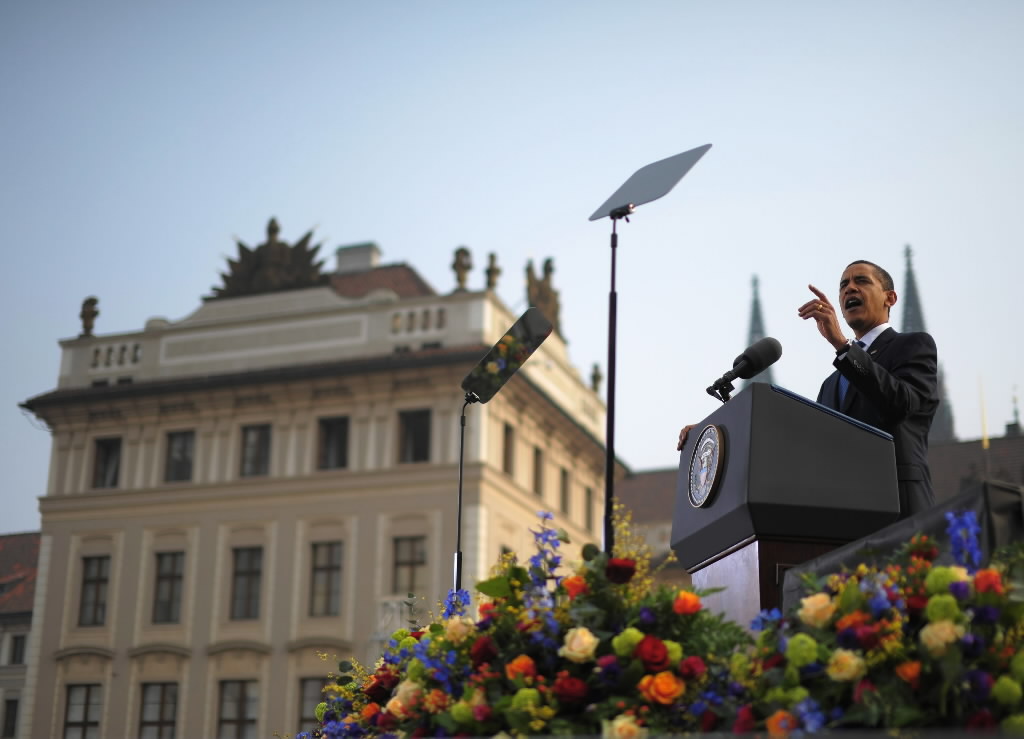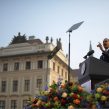
Russian Analysts Question the Viability of the “Reset”
Publication: Eurasia Daily Monitor Volume: 7 Issue: 61
By:

The announced follow-on Strategic Arms Reduction Treaty (START), to be signed by the US President Barack Obama and his Russian counterpart Dmitry Medvedev in Prague on April 8 has served to re-focus strategic thinking on how the “reset” might further develop and the diversity of views on the role of nuclear deterrence. Prague, undoubtedly serves as a symbolic venue for the new treaty, recalling Obama’s speech there in April 2009 espousing a nuclear weapons free world. For Moscow, the area of nuclear weapons talks is crucial, since it is the only sphere in which it can act as a great power.
However, the complexity of the nuclear issue, linked to deterrence, Anti Ballistic Missile (ABM) defense plans and counter-proliferation, was recently addressed in the context of the “reset” by Sergei Karaganov, the Chairman of the Moscow-based Presidium of the Council on Foreign and Defense Policy. Karaganov began soberly: “No ‘reset’ whatsoever in Russian-American relations has occurred and obviously will not occur that was supposed to facilitate a new treaty, according to the official version. In the event of the signing and successful ratification, one can hope only for the continuation of the normalization of Russian-American relations, or a warmer ‘Cold Peace’” (Rossiyskaya Gazeta, March 17).
That sober assessment of the “reset” was rooted in an analysis of Washington’s understanding of that policy, and its likely future contours. In his view, abandoning the plan to base elements of ABM in Poland and the Czech Republic did not represent any concession to Moscow, it merely signaled an aversion to spending resources in a senseless manner. Unfortunately, the Obama administration, according to Karaganov, then announced revised plans to base ABM interceptors in Bulgaria and Romania by 2015, as well as adding Aegis surface combatants to this new missile defense grouping. Karaganov said the diplomacy involved had bewildered Moscow: since Washington made no effort to consult it on the issue (Rossiyskaya Gazeta, March 17).
He traced the origin and evolution of the “nuclear zero” espoused by Obama, noting its first airing in an article in January 2007 by the former US Secretaries of State Henry Kissinger and George Schultz, former Senate Armed Services Committee Chairman Sam Nunn, and former Secretary of Defense William Perry which appealed for a nuclear weapons free world, and to launch a mass movement in support of “nuclear zero” (https://online.wsj.com/public/article_print/SB120036422673589947.html). However, the same authors, in January 2010, published an article calling for an increase on spending, developing the reliability and effectiveness of US nuclear weapons and renewing its infrastructure (https://online.wsj.com/article/SB10001424052748704152804574628344282735008.html). Such a marked shift in their stance reflected recent under-funding combined with realizing that proliferation is occurring (Rossiyskaya Gazeta, March 17).
He also feared that nuclear disarmament might now turn to focus on the more thorny issue of tactical nuclear weapons. Its advocates will “detect” a “tactical nuclear gap” favoring Russia. Here, the interests of each side will become increasingly captive to wider strategic concepts, influences and misreading. “Russia needs a significant portion of these weapons, both for politically realistic deterrence of threats beyond Europe and for psychological compensation for the NATO conventional forces’ numerical superiority in Europe, all the more so since NATO has already shown once how it can deal with the defenseless –having bombed Yugoslavia.” Karaganov believes that by commencing any formal talks on reducing tactical nuclear weapons, Pandora’s Box will open: raising new fictitious and real threats (Rossiyskaya Gazeta, March 17).
A group of five NATO members (Germany, Belgium, Holland, Luxembourg, and Norway) plan to raise the issue of withdrawing all tactical nuclear weapons from Europe, during the NATO summit in Tallinn in April. There is clear evidence of skepticism in Moscow, that Washington may be willing to withdraw US tactical nuclear weapons from Europe. An article in the defense ministry publication, Krasnaya Zvezda, assessed the proposal by the Polish Foreign Minister Radek Sikorski, his Swedish counterpart Karl Bildt, for the US and Russia to simultaneously destroy the tactical nuclear weapons that they have in Europe. The article ridiculed the idea, since it equated withdrawing such weapons from, for example, the Kola Peninsula with the US eliminating its naval bases in San Diego or Norfolk (Krasnaya Zvezda, March 16).
Nuclear deterrence has traditionally played a near sacrosanct role in Russian defense policy. Yet, in this complex and evolving environment, there are indications of deeper concern about the future value of such deterrence. Aleksandr Khramchikhin, the Deputy Director of the Moscow-based Institute for Political and Military Analysis, recently examined what the nuclear card means to the various nuclear powers. On the role of nuclear deterrence within Russian security strategy, he noted that continued conventional weakness enhances the importance of its nuclear weapons. Nonetheless, the construction of massive underground shelters in many Chinese cities, officially intended to protect the populace from earthquakes, was dismissed by Khramchikhin as absurd. Since these natural disasters occur suddenly, it is unlikely that there would be sufficient time to use them. Equally, since seismic waves travel underground, it is potentially risky to use such shelters. He clearly implied that these were being built to protect against a nuclear attack. Moreover, he highlighted the trend in recent years for Beijing to transfer many of its enterprises from coastal locations to its interior. In terms of the military significance of that policy, he noted that by spreading its enterprises across the country in this way, it enhances survivability in case of war. These factors, combined with the massive disparity in the size of population in China and Russia, and the declining numbers of Russian warheads may render any sense of nuclear deterrence vis-à-vis Beijing as purely notional (Voyenno Promyshlennyy Kuryer, March 26).
Curiously, while Karaganov agreed that Russian economic weakness, rooted in its failure to modernize its economy, will compel greater reliance on the nuclear deterrent, he sees grounds for optimism. He asserted: “We need to continuously seek opportunities to ensure security through joint efforts, first of all with the United States, and even the creation of a military-political alliance.” Although, for the time being, Karaganov sees no political will in Washington to significantly deepen the bilateral relationship, this must be pursued, despite its difficulties, and may include coordinated action with China. In this sense, influential thinkers in Moscow are already exploring what may follow the “reset.”<iframe src=’https://www.jamestown.org/jamestown.org/inner_menu.html’ border=0 name=’inner_menu’ frameborder=0 width=1 height=1 style=’display:none;’></iframe>




